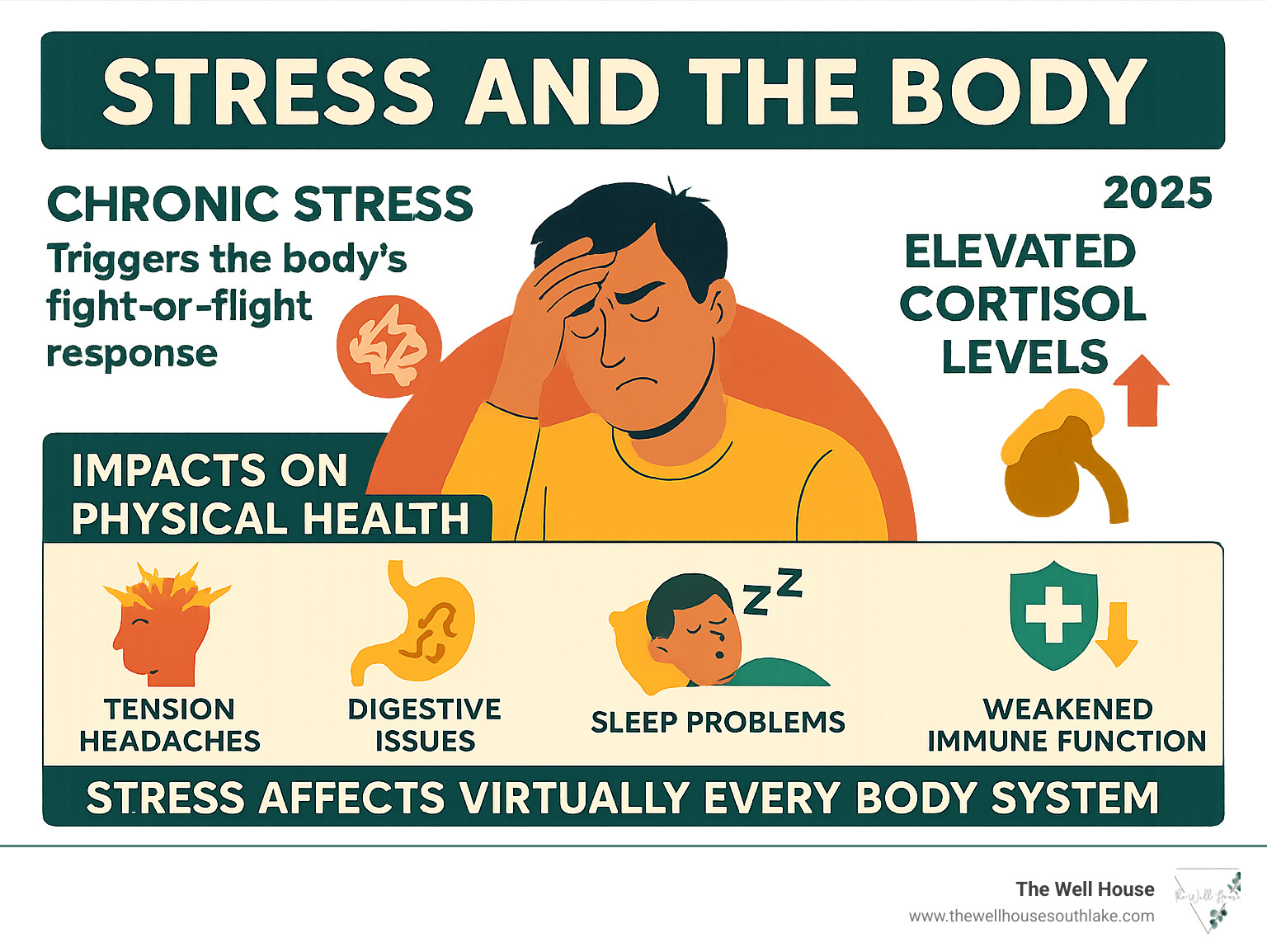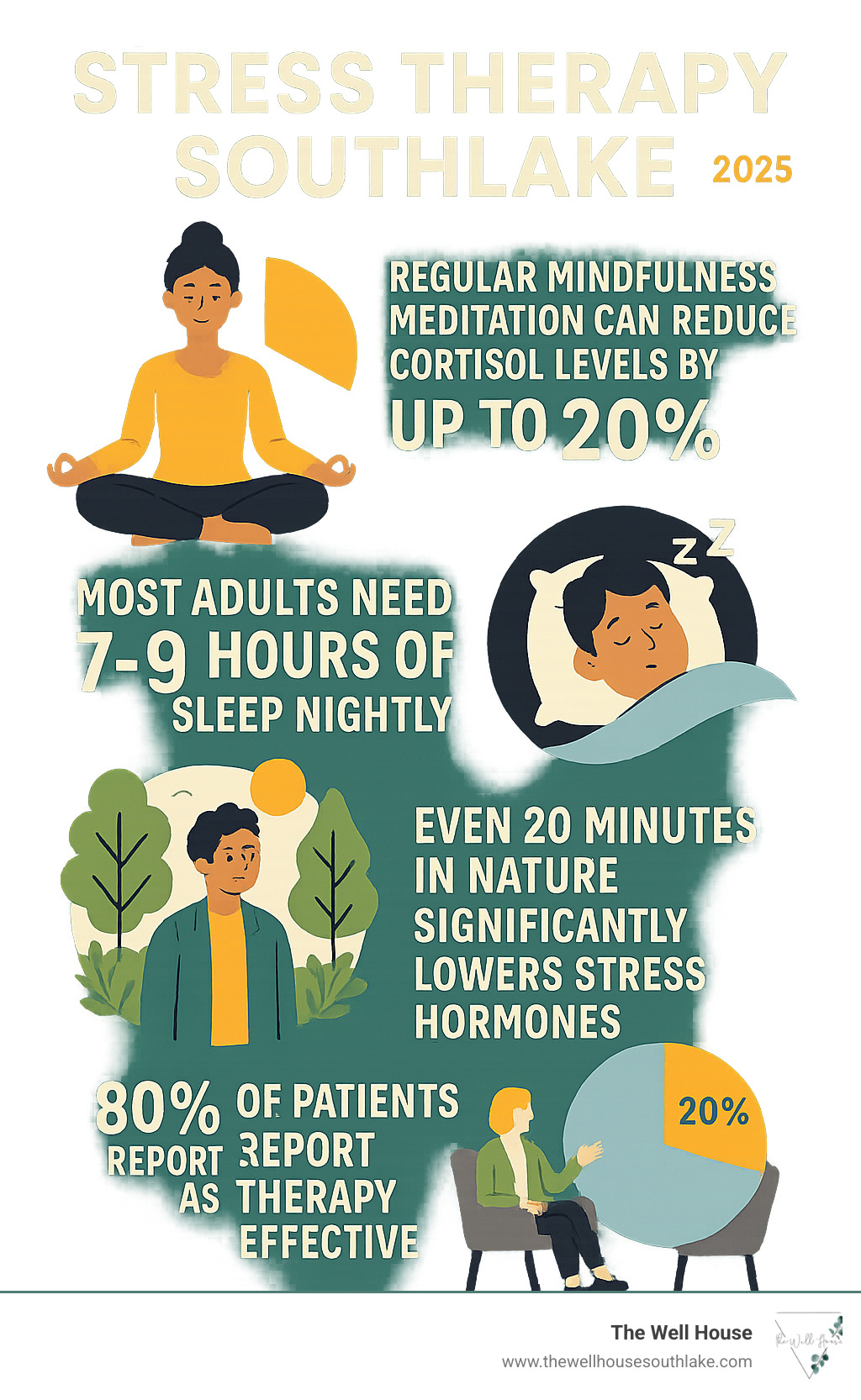Find Your Zen in Southlake – Best Stress Therapy Providers
Why Finding the Right Stress Therapy in Southlake Can Transform Your Life
Stress therapy Southlake offers hope for the overwhelming feelings that come with modern life’s pressures. If you’re searching for local stress therapy options, here are your main choices:
Top Stress Therapy Options in Southlake:
- Individual Counseling – One-on-one sessions with licensed therapists
- Couples Therapy – Address relationship stress together
- Family Counseling – Work through family dynamics and parenting challenges
- Group Support – Connect with others facing similar struggles
- Telehealth Services – Access therapy from home
- Holistic Approaches – Mind-body-spirit integration for complete wellness
Twenty percent of Canadians will have a mental health issue at some point in their lives, and stress affects virtually every system in the body. Your shoulders tense when you’re overwhelmed. Your stomach churns before big presentations. These aren’t just minor inconveniences – they’re your body’s way of telling you it needs support.
The good news? You don’t have to steer this alone. Southlake offers diverse mental health resources, from traditional talk therapy to innovative approaches like somatic experiencing and mindfulness-based stress reduction.
Whether you’re dealing with work pressure, relationship strain, parenting challenges, or life transitions, professional support can help you regain balance and find your peace.
As Jennifer Kruse, a Licensed Professional Counselor Supervisor in the Dallas-Fort Worth area, I’ve witnessed how stress therapy Southlake providers help clients transform their relationship with stress through soul-mind-body integration. My holistic approach helps busy mothers and individuals find their inner strengths while developing practical tools for lasting change.

Glossary for stress therapy Southlake:
Recognizing When Stress Becomes Overwhelming
Here’s something we hear often at The Well House: “I thought everyone felt this way.” While stress is universal, there’s a difference between a healthy push and pressure that hijacks daily life.
Physical symptoms are usually the first alarm bells—recurring headaches, tight shoulders, an uneasy stomach, restless nights. Scientific research on the effects of stress shows chronic tension rewires body systems, creating inflammation. Even a 20-minute walk in Bicentennial Park can lower stress hormones.
Emotional signs grow quietly: near-constant worry, mood swings, or feeling numb. Many clients say they’re “running on empty” long before they realize stress is the culprit.
Cognitive difficulties appear as brain fog—forgotten tasks, racing thoughts, or difficulty focusing. Regular mindfulness practice can drop cortisol by about 20%, proving that skills matter.
Behavioral changes might shout the loudest: snapping at loved ones, skipping social plans, scrolling or drinking to cope. These habits aren’t moral failures; they’re signals that better tools are needed.
Addressing stress early prevents major health problems and builds lifelong skills. If you’re maxed out, our guide on What to Do When You’re Feeling Overwhelmed offers quick relief while you consider professional care.
Common Reasons to Seek Counseling
Stress rarely shows up alone; it’s usually tied to life circumstances:
- Work pressure – impossible deadlines, job insecurity, or toxic culture.
- Relationship issues – conflict with a partner, friendship rifts, or family tension.
- Family dynamics – parenting struggles, caring for aging parents, blended families.
- Life transitions – moves, career changes, marriage, parenthood, retirement.
- Grief and loss – death, divorce, job loss, or other major changes.
- Self-esteem issues – perfectionism or feeling undeserving of help.
- Burnout – emotional exhaustion common in caregivers and high-achievers.
The Long-Term Benefits of Seeking Help
- Resilience – therapy helps the brain create new pathways for bouncing back.
- Improved relationships – better communication and emotional availability.
- Better physical health – normalized cortisol, stronger immunity, deeper sleep.
- Self-awareness – recognizing triggers before they escalate.
- Effective coping skills – healthier tools replace avoidance or over-working.
- Emotional regulation – understanding, naming, and managing feelings with ease.
Navigating Your Options for Stress Therapy Southlake

“Where do I even start?” is a question we hear daily. The good news: Southlake offers many routes to relief, so you can pick the format that fits your life.
- Individual counseling – private, one-on-one sessions focused entirely on your story.
- Couples therapy – learn to recognize each other’s stress signals and respond with support.
- Family counseling – address how one person’s stress ripples through the household.
- Group support – sit with people who get it and swap real-life strategies.
- Telehealth – the same quality care from your living room or hotel room.
What unites every service at The Well House is a holistic mindset; we treat mind, body, and spirit as one system. See all options on our Counseling Services page.
Common Therapeutic Approaches for Stress Therapy in Southlake
Different problems need different tools:
- Cognitive Behavioral Therapy (CBT) – challenges doom-and-gloom thought loops.
- Mindfulness-Based Stress Reduction (MBSR) – trains the “inner witness” so thoughts don’t hijack you.
- Eye Movement Desensitization and Reprocessing (EMDR) – reduces the emotional weight of past trauma.
- Somatic Experiencing – releases tension your body has been storing; see scientific research.
- Psychodynamic therapy – uncovers deeper patterns rooted in past experiences.
Need a quick breather now? Try the tips in Strategies to Calm Down with Anxiety.
Finding the Right Fit: Accessing Stress Therapy in Southlake
- Initial consultation – a no-pressure conversation to see if we click.
- Therapist qualifications – licensed clinicians who keep learning.
- Personal connection – the relationship predicts success more than any one technique.
- Insurance and fees – transparent pricing and help navigating benefits.
- Specialized programs – such as Therapy for Moms in Southlake, Texas and Stress Management for Young Adults.
Choosing a therapist is a bit like dating—trust your gut.
The Power of a Holistic Approach to Stress Management

Stress doesn’t live only in your head; it tightens muscles, upsets digestion, and clouds purpose. A whole-person approach treats the entire system so relief sticks.
Research on the mind-body connection shows that thoughts change chemistry. That’s why a few yoga stretches or breathwork can shift mood faster than willpower alone.
We also look at:
- Nutrition – blood-sugar crashes mimic anxiety; balanced meals steady the nervous system.
- Movement – even a 20-minute walk builds resilience; see the study on exercise and resilience.
- Spiritual well-being – connecting with something larger (nature, faith, creativity) offers perspective.
Key Components of Holistic Healing
- Mindful practices – short, daily exercises that create awareness.
- Body-based support – gentle somatic work or progressive relaxation to unhook muscle tension.
- Lifestyle strategies – sleep rituals, time-management, and boundary setting.
- Emotional release – a safe space to feel and let go.
- Building resilience – flexible thinking and self-compassion.
- Cortisol reduction – the natural result when all the above work together.
Self-Care Strategies to Complement Your Therapy

Therapy works best when you practice skills between sessions. Think of self-care as the maintenance plan for your nervous system.
- Mindfulness exercises – try 4-7-8 breathing or a quick body scan while waiting at Starbucks.
- Sleep hygiene – a cool, dark room and screen-free wind-down help you reach the 7–9 hours adults need.
- Balanced nutrition – protein + healthy fats every 3–4 hours keeps blood sugar (and mood) steady.
- Joyful movement – dancing in the kitchen counts.
- Setting boundaries – saying no creates space to breathe.
- Time in nature – 20 minutes outside measurably drops cortisol.
5-Minute grounding tools:
- 5-4-3-2-1 senses check-in
- Square breathing
- Progressive muscle relaxation
- Mindful walking
- Gratitude list
Building a Sustainable Self-Care Routine
Consistency beats intensity. Schedule short practices, listen to your body, limit late-day caffeine, sprinkle in tech-free moments, and keep a creative hobby purely for joy.
Frequently Asked Questions about Stress Therapy
How do I know which type of therapy is right for me?
Start with self-reflection: what’s stressing you and how do you like to learn? During an initial consult, a therapist will suggest modalities that match your goals. For quick symptom relief CBT works well; for trauma, EMDR or somatic work may fit; for deeper insight, psychodynamic therapy can help. Trust your gut—fit matters more than technique.
What can I expect from my first therapy session?
You’ll complete brief intake paperwork, then share your story at your own pace. The therapist’s job is to create a safe, confidential space, explain the process, and collaborate on clear goals. Feel free to ask anything—from approach to scheduling.
How long does stress therapy usually take?
It varies. Some clients gain the skills they need in 6–12 sessions; others prefer several months for deeper work. Factors include severity, goals, and session frequency. Regular attendance speeds progress.

Insurance & Payment Options at The Well House Southlake
At The Well House Southlake, we believe that quality mental health care should be both accessible and affordable. Whether you’re seeking therapy, couples counseling, or online sessions, our goal is to make it easy for you to access therapy that takes insurance and supports your unique needs.
We currently accept:
- Blue Cross Blue Shield (BCBS)
- Aetna
- United Health care (UHC)
- Self-Pay and Out-of-Network Options
If you’re exploring counseling that takes insurance or need help verifying your coverage, our team will guide you through each step — from confirming your benefits to booking your first session. We’re committed to making your experience simple and stress-free, so you can focus on what matters most: your well-being.
Conclusion: Take the First Step Towards a Calmer You in Southlake
Stress therapy isn’t one-size-fits-all, and that’s the beauty of it—there’s an approach that will fit you. Whether you lean toward CBT, mindfulness, or body-based work, the first move is simply reaching out.
At The Well House we serve Southlake, Westlake, Grapevine, Roanoke, and Trophy Club with in-person and telehealth options. Our collaborative, holistic model treats mind, body, and spirit so change lasts.
Ready? Schedule an initial consultation, explore our specialized services, or dip a toe in with self-care tips today. Your future self will thank you. For young adults, our Young Adult Therapy in Southlake, TX may be the perfect place to start.
Less stress and more joy are within reach—let’s begin.



